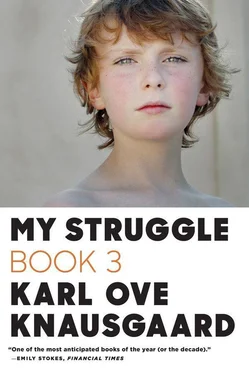He shoved his plate away and leaned back.
“Great meal, Mom!” he said.
“Thanks, Mom,” Yngve said, and snuck off. Five seconds later we heard the sound of his bedroom door being closed.
I stayed at the table for a little longer, in case Dad wanted to chat with me. He gazed out the window for a while, at the four boys hanging over the handlebars of their bikes by the second crossroads, then he got up, put his plate in the sink, took an orange from the cupboard, and went down to his study, the newspaper folded under his arm, without saying another word to anyone. Mom started clearing the table and I went to Yngve’s room. He was packing his bag. I sat down on his bed and watched. He had real soccer cleats, a pair of black Adidas with screw-on studs, decent Umbro shorts and some yellow-and-black IK Start socks. Mom had bought black-and-white Grane socks for him at first; he didn’t want them, so he gave them to me. But the best equipment he had was the Adidas tracksuit, it was blue with white stripes, in some smooth, shiny material, not that matte, crepe, elastic, gymsuit-style material that all tracksuits used to be made of. Sometimes I sniffed it, buried my nose in the smooth material, because it smelled wonderful. Perhaps I thought that because I wanted one myself so much the smell was imbued with my own desire, perhaps I thought it because the smell, so thoroughly synthetic, didn’t remind me of anything else — it didn’t seem to belong to this world. That in some way it bore a promise of the future. In addition to this tracksuit, he also had some blue-and-white Adidas wet-weather gear.
He said nothing as he packed. Pulled the big, red zipper to and sat down at his desk. Looked at the schedule lying on it.
“Did you get any homework?” I said.
He shook his head.
“We didn’t either,” I said. “Have you covered your books yet?”
“No, we’ve got the whole week to do it.”
“I’m going to do it tonight,” I said. “Mom’s going to help me.”
“Good for you!” he said, getting up. “I’m off. If I’m not back before midnight the headless man’s devoured me. I’d like to see how he manages that!”
He laughed and went downstairs. I watched him from the bathroom window, saw him put first one foot on the pedal, then shove off with the other and swing it over the crossbar and pedal as fast as he could in the highest gear until he reached the hill at such a speed that he could freewheel down to the crossroads.
When he had disappeared from view I went onto the landing, stood motionless for a moment to locate Mom and Dad. But all was silent.
“Mom?” I called softly.
No answer.
I went into the kitchen, she wasn’t there, then into the back room, she wasn’t there, either. Could she have gone to their bedroom?
I went there and stood outside the door for a moment.
No.
In the garden perhaps?
From various windows I scoured all four sides of the garden without catching a glimpse of her.
And the car was parked outside, wasn’t it?
Yes, it was.
Not knowing where she was somehow loosened my hold on the house, it was slackened in a confusing, quite disturbing way, and to counter it I went into my room and sat down on the bed to read some comics; that was when it struck me that of course she was downstairs in Dad’s office.
I almost never set foot in there. The few times I had, it had been to ask about something, if I could stay up and watch a particular TV program, for example, after knocking first and waiting for him to say, “Come in.” Knocking on the door came at a great cost, often so high that I preferred to go to bed without seeing the program. On a couple of occasions he had actually asked us to come in, when he wanted to show us something or give us something, such as envelopes with stamps on them. We put them in the sink in the spare kitchen, which, as far as I knew, was used exclusively for that purpose, to dissolve the gum, and, after drying them for a few hours, we were able to put them in our albums.
Otherwise I never went there. Even when I was on my own at home it never occurred to me. The risk that he would find out was much too great, he would discover anything untoward that was going on, he would sniff it out by some means or other, however well I tried to cover my tracks.
As he had with the hill when we were having dinner. Even though he hadn’t seen anything, only us on our way up, he knew we had been doing something wrong. Had he not been in such a good mood he would have brought everything into the open.
I lay on my stomach and started reading a Tempo. It was Yngve’s, he had borrowed it from Jan Atle, I had already read it many times. It was for older kids and for me it had a strong aura of belonging to a distant but utterly radiant world. I didn’t have any particular preferences regarding the settings of the comic books — it made no difference whether it was the Second World War, as in På Vingene or the Kamp series; nineteenth-century America, as in Tex Willer, Jonathan Hex, or Blueberry ; England between the two World Wars, as in Paul Temple ; or the fantasy realities, which the Phantom, Superman, Batman, the Fantastic Four, and all the Disney characters appeared in — but my feelings for them were different, they aroused different emotions in me, such that some of the series in Tempo, for example, the one that took place on a racetrack, or some in Buster, for example, Johnny Puma and Benny Goldenfoot, were particularly absorbing, perhaps because they were closer to the reality that I knew existed. In the summer you could see motorcyclists wearing the leathers and helmets with Formula 1 visors, you could see the low-slung cars with all those spoilers on TV, where they occasionally crashed into the barriers or one of the other cars, rolling over and catching fire, the driver being either burned to death or emerging from the flaming wreckage and calmly walking away.
Usually I was totally engrossed by these stories, without giving them a thought, the whole point of course was that you didn’t think, at least not with your own thoughts, you just followed the action. That afternoon, however, I quickly put the comic to one side, for some reason I couldn’t sit still, and it wasn’t much later than five o’clock, so I decided to go out again. I stopped at the top of the stairs, not a sound, she was still down below. What was she doing? She was hardly ever there. At least not at this time, I thought, bending down for my shoes in the hallway and tying the laces. I knocked on the door to Dad’s study. That is, the door leading to the corridor into which three rooms opened: the bathroom, the study, and the kitchen with the little box room at the end. In fact, it was a self-contained flat, but we had never rented it out to anyone.
“I’m going out!” I shouted. “Up to Geir’s!”
That is what I had been told to do, to tell them if I was going anywhere and say where.
Nevertheless, after a few seconds of silence, Dad’s irritated voice sounded from inside the study.
“All right, all right!” he shouted.
A few more seconds of silence passed.
Then Mom’s voice, friendlier, as if to compensate for Dad’s.
“That’s fine, Karl Ove!”
I shot out, closed the door carefully behind me, and ran up to Geir’s. I stood outside, called a few times until his mother came around the house. She had gardening gloves on, and was otherwise wearing khaki shorts, a blue blouse, and a pair of black clogs. In her hand she was holding a red trowel.
“Hi, Karl Ove,” she said. “Geir went out with Leif Tore a while ago.”
“Where did they go?”
“I don’t know. He didn’t say.”
“OK. Bye.”
Читать дальше












